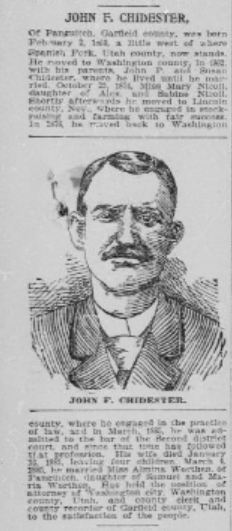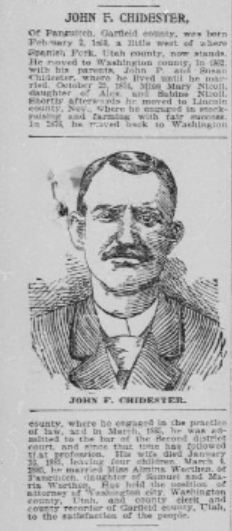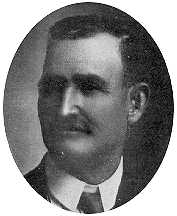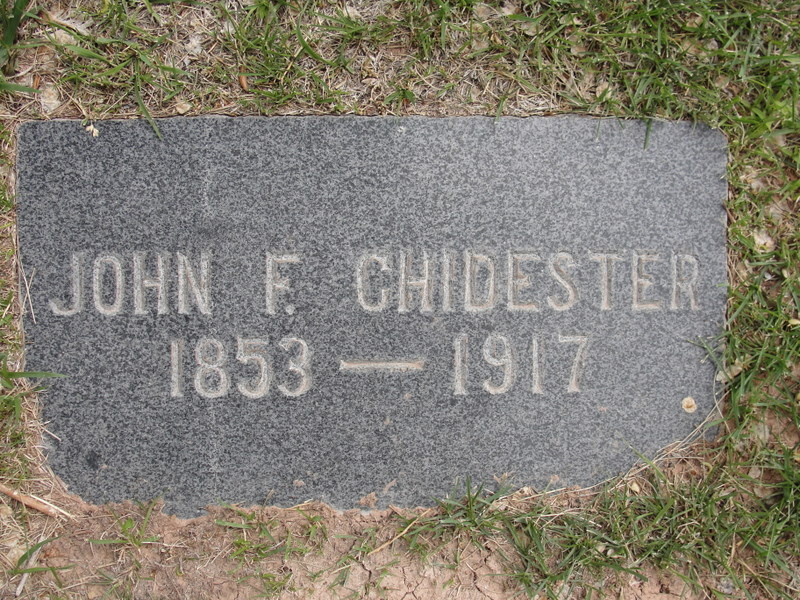HON. JOHN FOY CHlDESTER.
The name of John Foy Chidester is indelibly inscribed upon the pages of Utah's history. As a distinguished lawyer, as a member of the state constitutional convention, as a legislator, judge and political leader he did much to shape the development and promote the progress of the commonwealth. As a youth he suffered the handicap of lack of educational advantages such as were common upon the frontier in a new country. Throughout his life, however, he eagerly availed himself of every opportunity for intellectual advancement and was ever a close student and deep thinker. His ideals of citizenship and of life in general were very high and he utilized every chance to raise himself to their level.
Judge Chidester was born at Spanish Fork, in Utah county, in 1853, a son of John Peck and Susan (Foy) Chidester. The father, who was a native of the state of New York, followed the occupation of farming. He lived the life of a devout Christian and when his son, Judge Chidester, was very young, removed with his family to Washington county, Utah, where he had experiences peculiar to the pioneer development of the state.
The future judge shared in the hardships and privations incident to the settlement of the frontier and attended the schools of the locality, but the school system had at that time been developed to only a limited degree. He entered public life in Washington county as a constable and afterward followed various avenues of endeavor until 1883, when he removed to Panguitch, Utah, and determined to make the practice of law his life work. He there pursued his reading of Kent, Blackstone and other commentaries and in 1885 was admitted to practice before the Utah bar at Beaver, being later admitted to practice before the Supreme bench of the state. He followed his profession for ten years prior to the admission of the state into the Union and with the vital problems which came up for settlement concerning the transformation of Utah from a territory to a state he was closely, prominently and helpfully associated. He served as a member of the constitutional convention and left the impress of his individuality and ability upon the organic law of the state. While a member of that body he made a determined fight for woman's suffrage and other progressive measures. He was afterward elected state senator from Garfield county to the first general assembly of Utah in 1896 and aided in the adjustment of public policy and interests to the new statehood. When his term as senator had expired he was elected district attorney of the sixth judicial district and occupied that office for a number of years. He became a recognized leader in republican circles and was the first republican chairman of Garfield county and also delivered the first republican speech in the county after the division on national party lines. In 1902 he was appointed judge of the sixth judicial district to succeed W. M. McCarty, who had been elected a member of the supreme court, and upon the expiration of his appointive term Judge Chidester was elected to the office and remained upon the bench for ten years. In 1911 he became the candidate of his party for member of congress but was defeated by a small vote. In 1912 he was appointed a member of the state land board and served until 1917. Throughout the entire period of his public service, his course was marked by the most earnest devotion to duty—a devotion that manifested itself in close study of every vital situation or problem and unfaltering effort to bring about the best results for the commonwealth.
ln his church work, too, Judge Chidester displayed the same energy and capacity as in every other field in which he labored. He served on a mission to the southern states from 1889 until 1903. He was superintendent of Sunday schools and a high counselor in the Panguitch ward before removing to Richfield in 1906.
Judge Chidester was twice married. His first wife was Miss Mary Nicoll, whom he wedded in 1874 and who passed away in 1883, leaving four children. In 1885 he married Miss Almina Worthen, a daughter of Samuel Worthen, of Panguitch, a contracting mason who stood high in civil and ecclesiastical circles. Mrs. Chidester survives her distinguished husband and by her marriage she became the mother of eleven children. The surviving sons and daughters of Judge Chidester are: Mrs. Stephen Yates, of Salt Lake; Theodore, a resident of Panguitch; Mrs. Elijah Baker, of Union; Mrs. Leonard Ogden, of Richfield; Samuel H., of Sigurd; Arnon; Fenton, who was a member of the Medical Corps of the Navy and was honorably discharged in September, 1919; and Louise, Vera, J. Denzel, Thais and Alton, all of whom reside in Richfield. Mrs. Chidester and her sons Arnon and Denzel own and conduct a farm of forty-three acres four miles north of the city of Richfield.
The death of Judge Chidester occurred in R*ichfield, July 7, 1917, and was the occasion of the deepest regret, not only in his home city and in Sevier county but throughout the state. He was a man of jovial, kindly disposition, who easily made friends by reason of his sterling personal worth and always retained their warm friendship and regard. He was steadfast, honorable, kindly and helpful, and his enemies and political opponents never once, even in the heat of party politics, questioned his integrity. He was charitable to a degree but without ostentation, and so quietly were his good deeds performed that ofttimes none knew of them save himself and the recipients. He was every inch a man and one in whose death southern Utah lost a most valuable citizen, the bar an illustrious member and many poor families a generous friend. It has been said: "Not the good that comes to us, but the good that comes to the world through us is. the measure of our success," and judged by this standard John Foy Chidester was a most successful man.
HON. JOHN FOY CHlDESTER.
The name of John Foy Chidester is indelibly inscribed upon the pages of Utah's history. As a distinguished lawyer, as a member of the state constitutional convention, as a legislator, judge and political leader he did much to shape the development and promote the progress of the commonwealth. As a youth he suffered the handicap of lack of educational advantages such as were common upon the frontier in a new country. Throughout his life, however, he eagerly availed himself of every opportunity for intellectual advancement and was ever a close student and deep thinker. His ideals of citizenship and of life in general were very high and he utilized every chance to raise himself to their level.
Judge Chidester was born at Spanish Fork, in Utah county, in 1853, a son of John Peck and Susan (Foy) Chidester. The father, who was a native of the state of New York, followed the occupation of farming. He lived the life of a devout Christian and when his son, Judge Chidester, was very young, removed with his family to Washington county, Utah, where he had experiences peculiar to the pioneer development of the state.
The future judge shared in the hardships and privations incident to the settlement of the frontier and attended the schools of the locality, but the school system had at that time been developed to only a limited degree. He entered public life in Washington county as a constable and afterward followed various avenues of endeavor until 1883, when he removed to Panguitch, Utah, and determined to make the practice of law his life work. He there pursued his reading of Kent, Blackstone and other commentaries and in 1885 was admitted to practice before the Utah bar at Beaver, being later admitted to practice before the Supreme bench of the state. He followed his profession for ten years prior to the admission of the state into the Union and with the vital problems which came up for settlement concerning the transformation of Utah from a territory to a state he was closely, prominently and helpfully associated. He served as a member of the constitutional convention and left the impress of his individuality and ability upon the organic law of the state. While a member of that body he made a determined fight for woman's suffrage and other progressive measures. He was afterward elected state senator from Garfield county to the first general assembly of Utah in 1896 and aided in the adjustment of public policy and interests to the new statehood. When his term as senator had expired he was elected district attorney of the sixth judicial district and occupied that office for a number of years. He became a recognized leader in republican circles and was the first republican chairman of Garfield county and also delivered the first republican speech in the county after the division on national party lines. In 1902 he was appointed judge of the sixth judicial district to succeed W. M. McCarty, who had been elected a member of the supreme court, and upon the expiration of his appointive term Judge Chidester was elected to the office and remained upon the bench for ten years. In 1911 he became the candidate of his party for member of congress but was defeated by a small vote. In 1912 he was appointed a member of the state land board and served until 1917. Throughout the entire period of his public service, his course was marked by the most earnest devotion to duty—a devotion that manifested itself in close study of every vital situation or problem and unfaltering effort to bring about the best results for the commonwealth.
ln his church work, too, Judge Chidester displayed the same energy and capacity as in every other field in which he labored. He served on a mission to the southern states from 1889 until 1903. He was superintendent of Sunday schools and a high counselor in the Panguitch ward before removing to Richfield in 1906.
Judge Chidester was twice married. His first wife was Miss Mary Nicoll, whom he wedded in 1874 and who passed away in 1883, leaving four children. In 1885 he married Miss Almina Worthen, a daughter of Samuel Worthen, of Panguitch, a contracting mason who stood high in civil and ecclesiastical circles. Mrs. Chidester survives her distinguished husband and by her marriage she became the mother of eleven children. The surviving sons and daughters of Judge Chidester are: Mrs. Stephen Yates, of Salt Lake; Theodore, a resident of Panguitch; Mrs. Elijah Baker, of Union; Mrs. Leonard Ogden, of Richfield; Samuel H., of Sigurd; Arnon; Fenton, who was a member of the Medical Corps of the Navy and was honorably discharged in September, 1919; and Louise, Vera, J. Denzel, Thais and Alton, all of whom reside in Richfield. Mrs. Chidester and her sons Arnon and Denzel own and conduct a farm of forty-three acres four miles north of the city of Richfield.
The death of Judge Chidester occurred in R*ichfield, July 7, 1917, and was the occasion of the deepest regret, not only in his home city and in Sevier county but throughout the state. He was a man of jovial, kindly disposition, who easily made friends by reason of his sterling personal worth and always retained their warm friendship and regard. He was steadfast, honorable, kindly and helpful, and his enemies and political opponents never once, even in the heat of party politics, questioned his integrity. He was charitable to a degree but without ostentation, and so quietly were his good deeds performed that ofttimes none knew of them save himself and the recipients. He was every inch a man and one in whose death southern Utah lost a most valuable citizen, the bar an illustrious member and many poor families a generous friend. It has been said: "Not the good that comes to us, but the good that comes to the world through us is. the measure of our success," and judged by this standard John Foy Chidester was a most successful man.
Family Members
-
![]()
Sabina "Bina" Chidester Yates
1875–1969
-
![]()
Theodore Chidester
1877–1951
-
![]()
John Nicoll Chidester
1880–1913
-
![]()
Mary Ascenith Chidester Baker
1883–1974
-
![]()
Almina "Mina" Chidester Ogden
1887–1984
-
![]()
Samuel Henry Chidester
1889–1968
-
![]()
Arnon Alphaeus Chidester
1891–1977
-
![]()
Louise M. Chidester Johnson
1893–1980
-
![]()
Fenton Rollo Chidester
1896–1975
-
![]()
John Denzel Chidester
1900–1998
-
![]()
Thais Elizabeth Chidester Vreeland
1902–1999
-
![]()
Alton Parker Chidester
1905–1968
-
![]()
Mae Chidester
1908–1909
Sponsored by Ancestry
Advertisement
Advertisement





























